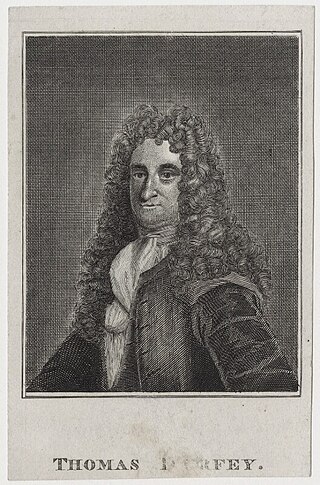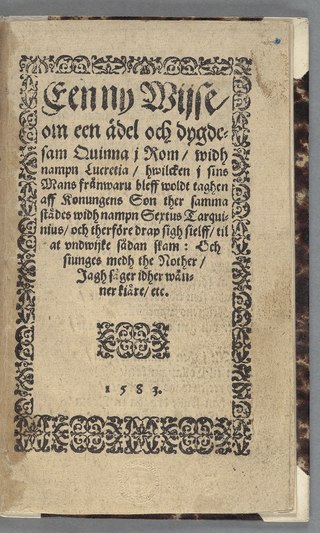
Ribaldry or blue comedy is humorous entertainment that ranges from bordering on indelicacy to indecency. Blue comedy is also referred to as "bawdiness" or being "bawdy". Like any humour, ribaldry may be read as conventional or subversive. Ribaldry typically depends on a shared background of sexual conventions and values, and its comedy generally depends on seeing those conventions broken.

The Child Ballads are 305 traditional ballads from England and Scotland, and their American variants, anthologized by Francis James Child during the second half of the 19th century. Their lyrics and Child's studies of them were published as The English and Scottish Popular Ballads. The tunes of most of the ballads were collected and published by Bertrand Harris Bronson in and around the 1960s.

Thomas d'Urfey was an English writer and playwright. He wrote plays, songs, jokes, and poems. He was an important innovator and contributor in the evolution of the ballad opera.
Edward Potts McCurdy was an American folk singer and songwriter. His most well-known song was the anti-war "Last Night I Had the Strangest Dream", written in 1950.
The year 1706 in music involved some significant events.
Henry Playford was an English music publisher, the younger son and only known surviving child of John Playford, with whom he entered business.

Please to See the King is the second album by Steeleye Span, released in 1971. A major personnel change following their previous effort, Hark! The Village Wait, brought about a substantial change in their overall sound, including a lack of drums and the replacement of one female vocalist with a male vocalist. The band even reprised a song from their debut, "The Blacksmith", with a strikingly different arrangement making extensive use of syncopation. Re-recording songs would be a minor theme in Steeleye's output over the years, with the band eventually releasing an entire album of reprises, Present – The Very Best of Steeleye Span.
"A Guy Is a Guy" is a popular song written by Oscar Brand. It was published in 1952.

A broadside is a single sheet of inexpensive paper printed on one side, often with a ballad, rhyme, news and sometimes with woodcut illustrations. They were one of the most common forms of printed material between the sixteenth and nineteenth centuries, particularly in Britain, Ireland and North America because they are easy to produce and are often associated with one of the most important forms of traditional music from these countries, the ballad.
"Old MacDonald Had a Farm" is a traditional children's song and nursery rhyme about a farmer and the various animals he keeps. Each verse of the song changes the name of the animal and its respective noise. For example, if the verse uses a cow as the animal, then "moo" would be used as the animal's sound. In many versions, the song is cumulative, with the animal sounds from all the earlier verses added to each subsequent verse.
In music, a catch is a type of round or canon at the unison. That is, it is a musical composition in which two or more voices repeatedly sing the same melody, beginning at different times. Generally catches have a secular theme, though many collections included devotional rounds and canons.
Irish music collecting is an area concerned with preserving the large body of traditional Irish music. Collections have been gathered by individual collectors of Irish music as well as organisations.
"The Baffled Knight" or "Blow Away the Morning Dew" is a traditional ballad existing in numerous variants. The first-known version was published in Thomas Ravenscroft's Deuteromelia (1609) with a matching tune, making this one of the few early ballads for which there is extant original music. The song was included in such notable collections as Pills to Purge Melancholy by Thomas d'Urfey (1719–1720) and Reliques of Ancient English Poetry by Thomas Percy (1765).
A Collection of Old Ballads is an anonymous book published 1723–1725 in three volumes in London by Roberts and Leach. It was the second major collection of British folksongs to be published, following Wit and Mirth, or Pills to Purge Melancholy. Ambrose Philips was once credited as the editor, but this has since been challenged.
Nationality words link to articles with information on the nation's poetry or literature.
"King John and the Bishop" is an English folk-song dating back at least to the 16th century. It is catalogued in Child Ballads as number 45 and Roud Folk Song Index 302.
Twat is an English-language vulgarism which means the vulva or vagina, and is used figuratively as a derogatory epithet. In British English, and Irish English it is a common insult referring to an obnoxious or stupid person regardless of gender; in American English, it is rarer and usually used to insult a woman. In Britain and Ireland, the usual pronunciation rhymes with "hat", while Americans most often use the older pronunciation that rhymes with "squat". This is reflected in the former variant spelling of "twot".
John Lenton was an English composer, violinist, and singer.
Oscar Brand was a Canadian-born American folk singer-songwriter, radio host, and author. He released nearly 100 albums and composed hundreds of songs, among them Canadian patriotic songs, songs of the U.S. Armed Forces, sea shanties, presidential campaign songs over the years, and songs of protest. His discography is extensive.
"No, Sir, No" is an English folk song describing a courtship. It has been collected from traditional singers in England and the USA, and in a bowdlerised version was taught to English schoolchildren in music lessons in the 1950s. Alternative titles include "No, Sir", "No, John, No", "O No John", "Yes Or No", "Cruel Father", "Ripest Apples", "Twenty Eighteen", "The Spanish Merchant's Daughter", "The Spanish Captain", "Spanish Lady", "Yonder Sits a Spanish Lady", "Yonder Sits a Pretty Creature", and "In Yonder Grove".